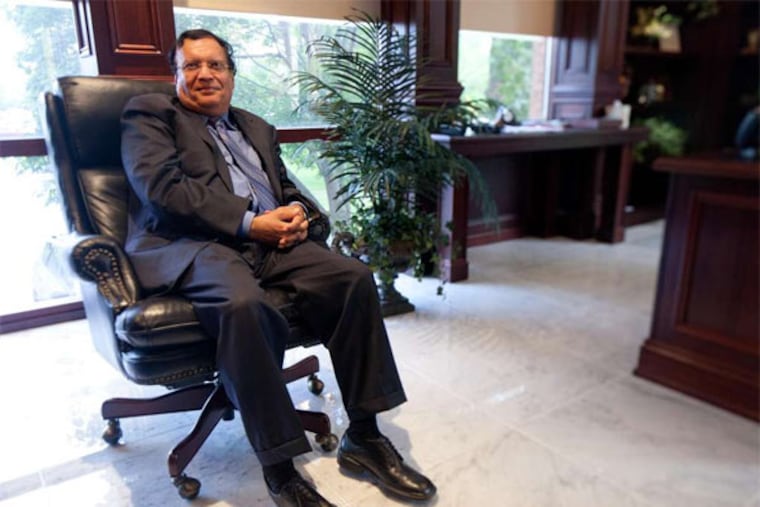Holtec chief on doing well and doing good
With the Benjamin Franklin Bridge in the background, Holtec International's chief executive, Krishna P. Singh, in July faced the news media, Gov. Christie at his side, and talked about plans to build a $260 million factory on Camden's waterfront, bringing, eventually, 3,000 jobs to the impoverished city.

With the Benjamin Franklin Bridge in the background, Holtec International's chief executive, Krishna P. Singh, in July faced the news media, Gov. Christie at his side, and talked about plans to build a $260 million factory on Camden's waterfront, bringing, eventually, 3,000 jobs to the impoverished city.
Maybe, someday, Camden would be the place where newly designed small nuclear reactors would revitalize the nuclear power industry.
"We look at this as our social responsibility," Singh, 67, told reporters as officials described how New Jersey would provide $260 million in tax incentives and Singh would guarantee 400 jobs.
It was a good day for Singh, and part of a good year - since, he says, Holtec's business of designing and manufacturing component parts for nuclear reactors, power plants, and spent nuclear fuel storage facilities has been expanding by 25 percent a year.
Question: If Holtec's business is doing so well, why does Holtec need any money from the state?
Answer: It's a good question. I would not make that kind of investment in New Jersey [without it]. It isn't feasible. My competition isn't South Carolina or Kentucky. My competition is China and Korea. That is where we have manufacturers who compete with us, and they get government money to put up the plants. Now, we pay [in the U.S.] the highest tax rate in the world and then on top of that, you tell me, to compete with these governments without any assistance.
Q: OK, so why didn't you choose those locations?
A: I'm committed to manufacturing in the U.S. That basically transcends business. It's a commitment to the society I made a long time ago.
Q: How about labor costs?
A: Imagine, I put up $260 million to build a plant, right? So, the cost of money is $26 million a year [over 10 years]. Divide that into 500 workers. They must generate that money. That's in addition to the [cost of] their labor. And let me give you another statistic: I pay for one worker in health care what my Chinese competitor pays as a total salary for five workers. Salary, not health benefit.
Q: People have criticized the state for these kinds of incentives.
A: So far, the state hasn't given me a dime. In fact, it's costing me. I'm paying for all the fees and all the permits. We have to finish the plant, spend $260 million, provide evidence, and a year later, they give me $26 million. It isn't as sweet and lovely as it seems.
Q: So Jersey is smart?
A: I think what the state has done is clever. If I give you the razor, you'll buy the blades. If the state helps me put up the plant, now I have to hire the people. Now I am tied to the local economy. You grow Camden by bringing in industries that can't pack up and leave the next day.
Q: You have an engineering background and so many patents. Do you miss the lab work?
A: I run the business to support my inventions. The ideas originate from running the business.
Q: With all your CEO responsibilities, when do you have time to invent?
A: I'm a social misfit in that respect. Don't tell this to anybody.
Q: I'm going to tell this to everybody. I'm a newspaper reporter.
A: I'm always thinking - as a result in social conversations, I'm never 100 percent there. I try to discipline myself, but it doesn't work. Because I'm not that smart, I have to think harder. I have to think longer.
KRISHNA SINGH
Title: President, CEO, Holtec International.
Homes: Southampton, Burlington County, Jupiter Island, Fla.; Brigantine.
Family: Wife, Martha; Children, Amy, 38, Krishna, 35.
Grew up: Bihar, India.
Diplomas: Ranchi University, India, mechanical engineering; Univ. of Pennsylvania, masters and Ph.D, mechanical engineering.
Favorite doodle: Design variations for a small nuclear reactor.
Thank God for Martha: She retrieves $5 and $10 bills he absentmindedly tosses out with his tissues.
His drink: Chai latte.
Naming rights: Krishna P. Singh Center for Nanotechnology, Univ. of Pennsylvania. EndText
HOLTEC INTERNATIONAL
Headquarters: Marlton and Florida.
Ownership: Privately held.
Bottom line: $130 million a year in profits.
Employees: 800 globally, 250 locally.
Facilities: Offices and research - Marlton; Jupiter Island, Florida; Factories - Turtle Creek, Pa.; Orrville, Ohio.
Beyond Camden: Construction in India, Ukraine and, possibly, South Carolina. EndText
MORE ONLINE
Krishna Singh: Can Camden's workforce match Carolina's? www.inquirer.com/jobbing
EndText